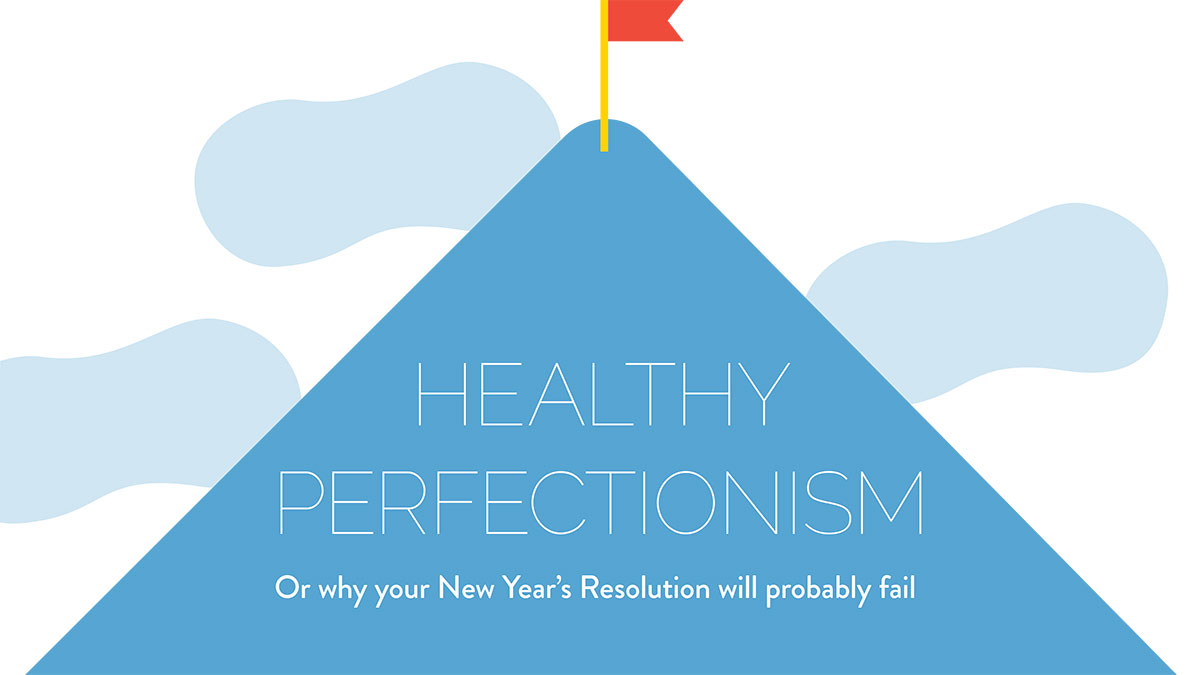Feature: Healthy Perfectionism
 Alex Patterson
Alex PattersonThere’s a student sitting alone in SUB late on a Sunday night, staring at a wall of text on their laptop screen.
They’re working on an assignment, but what’s motivating them to finish it? They could be pushed by a fear of failure, working towards an unrealistic or unattainable goal, or they could be anticipating a negative reaction from their peers if they receive a poor grade.
If they’re motivated by any of those reasons, they’re exhibiting the traits of a maladaptive perfectionist.
Professor John Dunn teaches in the Faculty of Physical Education and Recreation at the University of Alberta, with his focus of study being sports psychology — particularly the concept of perfectionism in athletes.
He explains that maladaptive perfectionists will set exactingly high standards often influenced by fear of negative judgment from their peers, and are much harder on themselves when they don’t reach them. Even if they do something well, they only see the places in which they failed.
“It’s like a student who gets 98 per cent on an exam, and then beat themselves up because they missed that two per cent,” Dunn says.
This could be the struggling student in SUB. Maybe they want praise from their professor, or they’re worried about what reaction their parents will have if they receive a grade that’s deemed unsatisfactory. The fear of negative judgment from others is driving them, but it’s also causing them significant amounts of anxiety, Dunn explains.
“A lot of maladaptive perfectionists are extremely self-critical largely because their self-worth is contingent upon being praised and receiving positive feedback,” he says.
Maladaptive perfectionists also set themselves up for failure, Dunn says, because they strive for unreachable goals while not realizing the positives that can come out of failure itself. They don’t take the opportunity to learn and grow from their failures and mistakes, they just dwell on their perceived failure.
The student could be working on their assignment, blindly pursuing their goal, while not looking back at their methods to see what could make them more successful in the future. Maybe they want to get 100 per cent, but failed to reach that goal previously because they tend to procrastinate and start assignments the night before they’re due.
A maladaptive perfectionist would look at that failure and inwardly criticize themselves for not performing well enough, while overlooking the fact that working on the assignment over the course of several days and not procrastinating may give them a better chance of reaching their goal. This is also a reason why New Year’s Resolutions have a tendency to fail.
When making a resolution, people will often choose to change something, like their overall health, and become upset when results aren’t immediately seen. They’ll get discouraged, blame themselves, and then stop working on their health altogether.
On the other side of the spectrum, adaptive, or healthy perfectionists, while still setting very high standards for themselves, understand that failure and setbacks are part of the learning process. They’re able to cope with failure in a much healthier way than maladaptive perfectionists.
“Because their self-worth isn’t so contingent on reaching this standard of excellence, they deal with mistakes a lot easier,” Dunn says.
So then what does it take to be an adaptive perfectionist?
The adaptive perfectionist sets reasonable goals. Goals need to be achievable, but people should also ensure they’re able to preserve when they fail. For many, especially during New Year’s resolution season, this can be difficult. Late January is around the time that many “resolutioners” retreat from the gym because they’re not seeing their goals pay off as quickly as they would have liked.
A way to combat those discouraging feelings, according to Dunn, is to set a series of short-term goals on the way to the long-term goal. This way, you give yourself multiple opportunities to feel accomplished throughout the process.
If you go to the gym with your only goal being to lose 25 pounds, then you’re only giving yourself one chance to feel accomplished, Dunn says. Whereas if you set more short-term goals along the way, such as losing two pounds per week, then you’re giving yourself more opportunities to feel a sense of accomplishment, and you’re less likely to become discouraged.
“Think of a climber climbing Mt. Everest … they don’t try to bite it off in one giant step, it’s just a series of little steps before they reach the top of the mountain,” Dunn says.
If the student wants to meet their high standards for their assignment, they can set a goal for the amount of work they want to do each day before its completion. That way, they can avoid becoming discouraged. They can look at completing a set amount of work each day as achieving a goal. Each day of work moves them closer to the summit of completion.
Aside from persevering through failure, the ability to learn from it is also key for an adaptive perfectionist. They see failures and setbacks as opportunities for self-improvement.
“People have to accept that adversity and challenges are part of the route,” Dunn says. “The people that seem to excel and exceed look at failure as probably the best learning opportunity they’ve ever been given.”
The student could learn from their previous mistakes, such as trying to finish an assignment in one night and still get 100 per cent, and focus on a more realistic goal that can be achieved over a more reasonable period of time. Their new goal could be to get an A, while working on the assignment for an hour a day over the course of a week.
Sometimes, students can’t put these adaptive behaviours into practice by themselves, and need a support system, which LiveWell attempts to bring to students at the U of A.
According to the program’s coordinator, Megan Ragush, one of LiveWell’s goals is to help students who are lacking a connection on campus.
“There are students that come to campus and don’t have a single social interaction, and then they leave,” Ragush says. “To me, that’s so crazy, because having that connection for me was so important.”
For Ragush, LiveWell’s aim is to provide “that one friendly face” on campus, which can help students start to develop a positive support network.
Once those connections and positive supports are in place, students can lean towards a more adaptive view of perfectionism and goal setting, Dunn explains.
“If I know that I’ll be valued by my teammates, coaches, or parents, regardless of my performance, then it will increase the likelihood of developing adaptive perfectionist tendencies,” he says.
With these adaptive tools in mind, that stressed student in SUB can now work towards more positive motivation and goal setting techniques, and maybe make those long nights at least a little more enjoyable.




